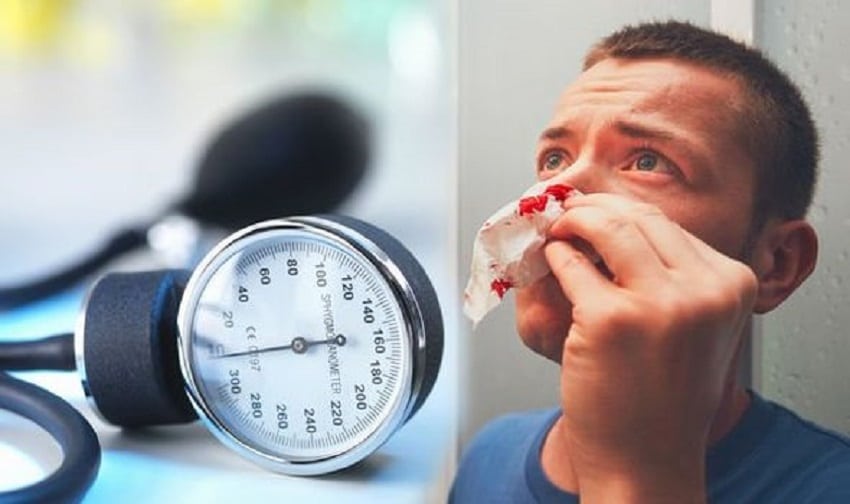
High bloodstream pressure, medically referred to as hypertension, is really a bloodstream pressure studying greater than 130/80 millimeters of mercury (mm Hg). Stage 2 hypertension is understood to be a bloodstream pressure more than 140/90 mm Hg.
It’s believed that 108 millionTrusted Source adults within the U . s . States have high bloodstream pressure, and just in regards to a quarter of those individuals have their bloodstream pressure in check.
Getting high bloodstream pressure puts you in a increased chance of developing potentially existence-threatening conditions just like a stroke or heart attack. High bloodstream pressure may also be known as the silent killer since it frequently doesn’t cause any noticeable signs and symptoms.
Nosebleeds generally aren’t an indicator of high bloodstream pressure. However, there’s still debate whether individuals with high bloodstream pressure have more frequent or severe nosebleeds.
Here’s exactly what the research states so when a nosebleed can be a manifestation of a clinical emergency.
Does high bloodstream pressure cause nosebleeds?
Whether high bloodstream pressure causes an elevated chance of nosebleeds remains a subject of dialogue.
Although high bloodstream pressure isn’t recognized to directly cause nosebleeds, it’s probable that it could make the bloodstream vessels inside your nose to become weaker to damageTrusted Source while increasing bleeding timeTrusted Source.
Inside a recent 2020 studyTrusted Source, researchers used data in the Korean National Medical Health Insurance Plan to examine the chance of nosebleeds in individuals with high bloodstream pressure.
In several 35,749 participants, researchers found individuals with past hypertension had an elevated chance of nosebleeds requiring hospital visits when compared with individuals with no good reputation for high bloodstream pressure.
Based on the American Heart Association, high bloodstream pressure doesn’t cause nosebleed unless of course you’ve very high bloodstream pressure known as a hypertensive crisis.
Exactly what is a high bloodstream pressure (hypertensive) crisis?
A hypertensive crisis is really a sudden spike inside your bloodstream pressure over 180/120 mm HgTrusted Source that may be existence-threatening. It’s a clinical emergency that needs immediate medical assistance.
Whenever your bloodstream pressure reaches this level, you’re at a bad risk of circulation system damage that can result in serious conditions like:
- cardiac arrest
- stroke
- kidney damage
- eclampsia
- damage to the eyes
- lung edema
People experiencing hypertensive crisis frequently experience nosebleeds from harm to the bloodstream vessels within their nose. Other common signs and symptoms include:
- headaches
- severe anxiety
- dizziness
- difficulty breathing
- chest discomfort
- confusion
- nausea
- vomiting
Do you know the signs and symptoms of high bloodstream pressure?
High bloodstream pressure is frequently known as the silent killer. It always doesn’t produce noticeable signs and symptoms unless of course you’ve got a hypertensive crisis. The only method to know without a doubt for those who have high bloodstream pressure is to buy an evaluation.
While you might be unable to notice it with no test, chronic high bloodstream pressure can lift up your perils of developing numerous serious conditions like:
- heart failure
- cardiac arrest
- stroke
- transient ischemic attack (TIA)
- kidney disease
Can getting high bloodstream pressure with nosebleeds be an indication of another condition?
Nearly half of yankee adultsTrusted Source have high bloodstream pressure. It’s relatively present with have high bloodstream pressure as well as experience nosebleeds for unrelated reasons. Contact with dry air, picking onto your nose, and lots of other concerns can result in nosebleeds.
Experiencing nosebleeds and bloodstream pressure together may also be brought on by utilization of illegal drugs like cocaine.
So what can frequent nosebleeds be considered a characteristic of?
Nosebleeds are frequently harmless. Probably the most commonTrusted Source reason for nosebleeds is nose-picking (medically termed “digital manipulation”). ConditionsTrusted Source that dry up the membrane of the nose, some drugs, and injuries will also be common causes.
Here are a few problems that can directly or not directly result in a nosebleed.
- allergic reactions
- cuts and scrapes inside your nose
- foreign objects stuck in nose
- inhaling chemicals
- inhaling cold or dry air
- nasal cannula use
- nose-picking
- traumatic nose injuries
- upper respiratory system infection
- energetic nose blowing or sneezing
Some problems that affect your circulatory system may increase your odds of creating a nosebleed. Included in this are:
- alcoholism
- cancer
- circulation system deformities
- von Willebrand disease
- hemophilia
Numerous medications or drugs can lead to nosebleeds. Some include:
- illegal drugs like cocaine
- nonsteroidal anti-inflammatory drugsTrusted Source (NSAIDs) for example ibuprofen, naproxen, aspirin
- platelet aggregation inhibitors and anticoagulants
- supplements like e vitamin, ginkgo, or ginseng
- nasal sprays
When you should visit a physician
Most nosebleeds aren’t an indication of a significant condition. However, if bleeding lasts more than twenty minutes, you’ve got a heavy bloodstream flow, or maybe it developed following a mind injuries, you need to visit a physician.
High bloodstream pressure gets to be more normal with age. Go to your physician regularly to watch your bloodstream pressure and track the way it changes as time passes. Departing high bloodstream pressure out of control puts you vulnerable to developing numerous potentially existence-threatening conditions.
In case your bloodstream pressure is greater than 180/120 mm Hg, you need to seek immediate medical assistance.
Takeaway
There’s still debate whether high bloodstream pressure increases the likelihood of developing nosebleeds. Individuals with high bloodstream pressure could get more frequent or even more severe nosebleeds, but more research is required to completely understand the hyperlink.
High bloodstream pressure is frequently known as the silent killer since it usually doesn’t cause noticeable signs and symptoms. Visit your physician for those who have high bloodstream pressure to learn to best ensure that it stays in check.
